Guizhou University
Guizhou University (Chinese: 贵州大学) is a provincial public university located in suburban Guiyang, Guizhou, China. It is affiliated with the Province of Guizhou and is co-sponsored by the Ministry of Education and the province. The university is part of Project 211 and the Double First Class University Plan.[3]
 | |||||||
Other name | 贵大 Guì Dà | ||||||
|---|---|---|---|---|---|---|---|
| Motto | 明德至善,博学笃行 | ||||||
| Type | Public | ||||||
| Established | 1902 | ||||||
| President | Song Bao An | ||||||
| Party Secretary | Yao Xiaoquan | ||||||
Academic staff | 4,163 (Jun 2022)[1] | ||||||
| Students | 47,944 (June 2022)[1] | ||||||
| Undergraduates | 34,437 (June 2022)[1] | ||||||
| Postgraduates | 13,507 (June 2022)[1] | ||||||
| Location | Guiyang, Guizhou, China 26°25′21″N 106°40′09″E | ||||||
| Campus | Urban, 362.22 ha (895.1 acres)[2] | ||||||
| Colours | Red | ||||||
| Website | www | ||||||
 | |||||||
| Chinese name | |||||||
| Simplified Chinese | 贵州大学 | ||||||
| Traditional Chinese | 貴州大學 | ||||||
| |||||||
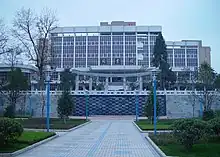
Founded in 1902, it is the flagship institution of higher learning in Guizhou province. The university was a national key university in the “One Province, One School” project in the Midwest of China.[4] With over 30,000 students, Guizhou University is one of the largest universities in Southwest China and is consistently ranked the best in the province.[5]
History
The predecessor of the modern Guizhou University was known as the Guizhou Institute of Higher Learning (贵州大学堂), which was founded in 1902. The institute evolved into the Provincial Guizhou University (省立贵州大学), National Guizhou College of Agriculture and Engineering (国立贵州农工学院), and finally National Guizhou University (国立贵州大学).
In 1997, the Guizhou Agricultural College, Guizhou Institute of Arts, and Guizhou Agricultural Cadre-Training School were merged into NGU to form Guizhou University.
In 2004, the Guizhou University of Technology merged into Guizhou University to complete the current Guizhou University. In 2005, the university was invited as a member of Project 211 by the Ministry of Education.
The university is included in the Chinese state Double First Class University Plan.
Guizhou University established a sister school relationship with the Presbyterian College in Clinton, South Carolina; the latter offers a Chinese language program for the fifteen American students every year.
Disciplines
The university consists of 39 colleges and offers programs of study in 11 academic divisions leading to associate, baccalaureate, master's, and doctoral degrees. These include:
- Agriculture
- Administration
- Economics
- Education
- Engineering
- History
- Law
- Liberal arts
- Medicine
- Philosophy
- Sciences
Rankings and reputation
Guizhou University ranked the best in Guizhou Province by several major international university rankings.[6][7][5][8] As of 2022, Guizhou University ranked 579th by SCImago Institutions Rankings among research universities around the world.[6] The 2021 CWTS Leiden Ranking ranked Guizhou University at 755th in the world based on their publications for the period 2016–2019.[8] The university was ranked 701-800th globally by the Academic Ranking of World Universities (ARWU).[9] The Nature Index 2021 Annual Tables by Nature Research ranked Guizhou University at 335th among leading academic research institutions in the Asia-Pacific for the high quality of research publications in natural science.[10]
As of 2021, Guizhou University ranked 135th in China by the Academic Ranking of World Universities and 164th by the U.S. News & World Report Best Global University Ranking.[7][5]
| Subjects ranking by | 2021 Global Ranking |
|---|---|
| U.S. News & World Report Best Global University Ranking[7] | |
| Plant and Animal Science | 289th |
| Chemistry | 715th |
| Engineering | 824th |
| Academic Ranking of World Universities (ARWU)[9] | |
| Mathematics | 301-400th |
International cooperation and Peace Corps involvement
In 1989 Guizhou Agricultural College, then a separate university, began hosting VSO teachers in the Foreign Language Department. The following year, Guizhou University began hosting foreign teachers from the AISH programme in Australia and visiting teacher programmes in both New Zealand and the University of Alabama. Simultaneously, VSO teachers from the UK and the Netherlands were recruited to work in other Guiyang institutes of higher education including the school of fashion and the catering college, both experiencing booms concurrent with Guiyang's emergence from relative obscurity. These teachers taught in both the undergraduate and post-graduate programmes at each institution.
In 2005, eight years after Gui Nong (Guizhou Agricultural College) was merged with Gui Da (Guizhou University), Guizhou University began hosting United States Peace Corps Volunteers. The volunteers teach at both the undergraduate and graduate level in the School of Foreign Languages.
To strengthen educational exchanges and bilateral ties between China and Gambia, Guizhou University in 2018 signed a memorandum of understanding with University of Gambia to establish a Confucius Institute at the University of Gambia.[11]: 139
Campus
Guizhou University has nine campuses situated in different locations around the city of Guiyang. The administrative center is located on the North Campus on the Huaxi River, Huaxi District of Guiyang.
Gallery
 Emblem of the National Guizhou University (国立贵州大学), 1940s.
Emblem of the National Guizhou University (国立贵州大学), 1940s.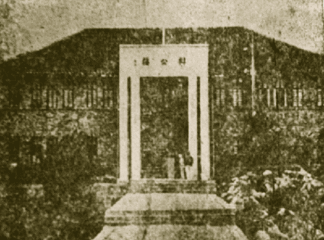 Administration Building of the National Guizhou University (国立贵州大学), 1940s.
Administration Building of the National Guizhou University (国立贵州大学), 1940s.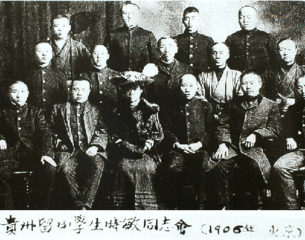 Guizhou Students in Tokyo, Japan in 1906. Mr. Zhang Xielu (first from left in the first row) was a student of Guizhou Institute of Higher Learning (贵州大学堂)-the predecessor of Guizhou University.
Guizhou Students in Tokyo, Japan in 1906. Mr. Zhang Xielu (first from left in the first row) was a student of Guizhou Institute of Higher Learning (贵州大学堂)-the predecessor of Guizhou University.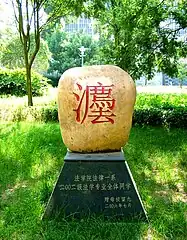 A Gift to the university from Law Students of Class 2002
A Gift to the university from Law Students of Class 2002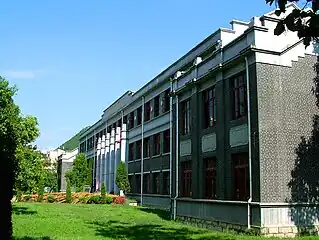 Department of Physics and Electronics-North Campus
Department of Physics and Electronics-North Campus
References
- "学校简介". Guizhou University. Retrieved 2022-06-09.
- "About Guizhou University, General Information". Guizhou University. Retrieved 1 February 2019.
- "教育部 财政部 国家发展改革委 关于公布世界一流大学和一流学科建设高校及建设 学科名单的通知 (Notice from the Ministry of Education and other national governmental departments announcing the list of double first class universities and disciplines)".
- "General Information_Guizhou University". www.gzu.edu.cn. Retrieved 2022-04-09.
- "ShanghaiRanking's Best Chinese Universities Ranking". www.shanghairanking.com. Retrieved 2022-04-09.
- "Guizhou University Ranking". www.scimagoir.com. Retrieved 2022-04-09.
- "U.S. News & World Report Best Global University Ranking Guizhou University". US News. 2020-10-21. Retrieved 2021-10-23.
- Studies (CWTS), Centre for Science and Technology. "CWTS Leiden Ranking". CWTS Leiden Ranking. Retrieved 2021-10-24.
- "ShanghaiRanking-Guizhou University". www.shanghairanking.com. Retrieved 2022-04-09.
- "2021 tables: Institutions - academic | Annual tables | Nature Index". www.natureindex.com. Retrieved 2022-04-09.
- Shinn, David H.; Eisenman, Joshua (2023). China's Relations with Africa: a New Era of Strategic Engagement. New York: Columbia University Press. ISBN 978-0-231-21001-0.